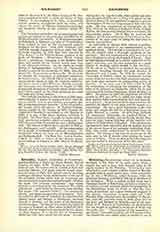

Kilwardby, ROBERT, Archbishop of Canterbury, Cardinal–Bishop of Porto and Santa Rufina, died at Viterbo, September 11, 1279. Nothing is known of his birth or early life, except that he studied at Paris and probably Oxford. For many years he taught grammar and logic at Paris with special success, devoting particular attention to the development of the use of the syllogism, during which time he composed numerous treatises on grammar and philosophy. Of these the work “De divisione scientiarum” was widely studied, as is evidenced by the numerous MS. copies still extant. Later in life he also wrote some theological works: “De passione Christi”, “De sacramento altaris”, and some commentaries on Scripture. Feeling called to the Order of Preachers, he abandoned his secular career and became a Dominican, devoting himself to theology and the study of the Scriptures and the Fathers. In 1261 he was chosen provincial of his order in England, an office which he held till 1272. Shortly after he ceased to be provincial he was chosen by Pope Gregory X to fill the See of Canterbury, which had then been vacant for two years. As archbishop-elect he, together with other nobles and prelates, proclaimed Edward I as King of England on the death of Henry III, and appointed a regency to govern the kingdom till the new king returned from the Crusades. He was consecrated at Canterbury on February 26, 1273, by the Bishop of Bath and Wells, William Bytton, the pope having allowed him to nominate the consecrating prelate. On May 8 he received the pallium, and he was enthroned at Canterbury in September of the same year, he being the first friar to become metropolitan.
As archbishop he showed little interest in politics, but was very energetic in the administration of his spiritual duties. Having held a convocation in London, he entered upon a thorough visitation of the province. This was interrupted in 1274, as he had to leave England to attend the Council of Lyons. Here he distinguished himself as an ardent supporter of the pope’s authority, and his own reputation as a great master of theology added weight to his advocacy. On his return to England he resumed his canonical visitation, traveling through the large dioceses of Winchester and Lincoln. In 1276 he visited the University of Oxford, where he condemned several errors, deprived masters who held erroneous opinions, and took other measures for safeguarding purity of doctrine. In the same year (June 16, 1276) he had the consolation of attending the translation of the relics of St. Richard at Chichester, whose life he had encouraged his brother Dominican, Ralph Bocking, to write. As primate he held two important provincial synods in 1273 and 1277, in which the lower clergy were granted fuller representation than had formerly been allowed. In his private life he was noted for his sanctity, his charity to the poor, and his success as a peacemaker. He was a great benefactor of his own order, and bought the site for a Dominican house at Castle Barnard in London. In 1278 Pope Nicholas III nominated Kilwardby as Cardinal–Bishop of Porto and Santa Rufina, and on July 25 he left England for Italy, taking with him all the registers and archives of Canterbury Cathedral. This unfortunate loss has never been recovered, and the earliest records of the see are those of his successor Archbishop Peckham, who vainly endeavored to recover the lost papers. The change of life was too severe for an old man, and he fell ill shortly after joining the papal court at Viterbo. There he died in the following year and was buried in the convent of his own order.
EDWIN BURTON

